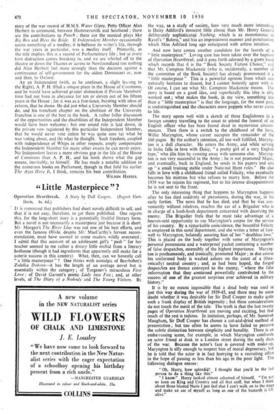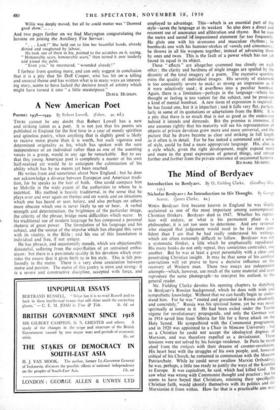"Little Masterpiece " ?
IT is rumoured that publishers find short novels difficult to sell, and that if is not easy, therefore, to get them published. One regrets this, for the long-short story is a potentially fruitful literary form.
..e But a novel is not necessarily a masterpiece just because it is short. Mi. Morgan's The River Line was not one of his best efforts, and even the famous Olivia, despite Me MacCarthy's fervent recom- mendation, must have seemed to some readers wildly overrated ; I admit that this account of an adolescent girl's " pash " for her teacher seemed to me rather a dreary little orchid from a literary hothouse (though it had ingredients that apparently still make for a coterie success in this country). What, then, can we honestly call "a little masterpiece " ? One thinks with nostalgia of Beerbohm's Zuleika Dobson—it has the length of an average novel but is essentially within the category ; of Turgenev's miraculous First Love ; of David Garnett's poetic „Lady into Fox; and, at other levels, of The Diary of a Nobody and The Young Yisiters. By the way, as a study of society, how very much more interesting is Daisy Ashford's innocent little classic than Mr. Henry Green's deliberately sophisticatsi Nothing, which is as monotonous as Ravel's " Bolero," and has an impressionist manner and punctuation which Miss Ashford long ago anticipated with artless intuition.
And now here comes another candidate for the laurels of a "little masterpiece." Loving care has been taken over the baptism of Operation Heartbrpak, and it goes forth adorned by a green band which records that it is the "Book Society Fiction Choice," and that Mr. Compton Mackenzie (who is, incidentally, a member of the committee of the Book Society) has already pronounced it a "little masterpiece" This is a powerful opinion from which one naturally hesitates to dissent, but I cannot honestly agree with it. Of course, I can see what Mr. Compton Mackenzie means. The story is based on a good idea, and superficially this idea is ably worked out ; what makes the book, in my view, something less than a "little masterpiece" is that the language, for the most part, is undistinguished and the characters mere puppets who never come to life.
The story opens well with a sketch of three Englishmen in a foreign country travelling to the coast to attend the funeral of an English officer who has been found dead in mysterious circum- stances. Then there is a switch to the childhood of the hero, Willie Maryngton, whose career occupies the remainder of the 160 pages. By the author's intention, all too well fulfilled, iviaryng- ton is a dull character. He enters the Army, and while serving in India falls in love with Daisy, "a pretty girl of a very English type," who jilts him by f unning away with someone else. Maryng- ton is not very successful in the Army ; he is not promoted' Major, and eventually, back in England, he sends in his papers b.nd sets up "a small training stable under Naticnal Hunt rules." He also falls in love with a childhood friend called Felicity, who eventually becomes his mistress but who refuses to marry him. Before the 1939 war he rejoins his regiment, but to his intense disappointment he is not sent to the front.
The only interesting thing that happens to Maryngton happens after he has died suddenly of pneumonia, during the war, in his early forties. The news that he has died, and that he Was con- veniently without relatives, reaches the ear of a Brigadier who is in charge of a hush-hush department concerned with deceiving the enemy. The Brigadier feels that he must take advantage of a heaven-sent opportunity to use Maryngton's corpse for the service of his country. By a remarkable coincidence, the beautifa Felicity is employed in this sameaepartment, and she writes a letter of fare- well to Maryngton, belatedly assuring him of her "deathless love." This is placed on the body together with some of Maryngton's personal possessions and a waterproof packet containing a number of false despatches, ostensibly of the highest importance. Maryng- ton is posthumously, and ironically, promoted Major ; in due course his uniformed body is washed ashore on the coast of a (theo- retically) neutral country ; and, as had been hoped, the forged despatches are thence conveyed to the enemy, "where the false information that they contained powerfully contributed to the success 'of one of the greatest surprises ever achieved in military history."
It is by, no means impossible that a dead body was used in just this way during the war of 1939-45, and there may be some doubt whether it was desirable for Sir Duff Cooper to make quite such a frank display of British ingenuity ; but these considerations do not touch the merit of the tale. The truth is that the last twenty pages of Operation Heartbreak are moving and exciting, but that much of the rest is tedious. In imitation, perhaps, of Mr. Somerset Maugham, Sir Duff Cooper has chosen a cut-and-dried method of presentation ; but too often he seems to have failed to perceive the subtle distinction between simplicity and banality. There is an embarrassing scene, for example, in which Maryngton- confronts an actor friend at dusk in a London street during the early days of the war. Because the actor's face is covered with make-up, Maryngton is silly enough to suspect him of moral degeneracy, but he is told that the actor is in fact hurrying to a recruiting office in the hope of passing as less than his age in the poor light. The following dialogue ensues: "Oh, Horry, how splendid! I thought that you'd be the last person to do a thing like this." "1 know." Horry looked almost ashamed of himself. "I'm not so keen on King and Country and all that stuff, but when I think about those blasted Nazis I just feel that I can't walk on to the stage and make an ass of myself as long as one of the- bastards is left alive." Willie was deeply moved, but all he could mutter was "Damned good show.",. . .
And two pages farther on we find Maryngton congratulating the heroine on joining the Auxiliary Fire Service: " . . Look!" She held out to him her beautiful hands, already dirtied and roughened by labour.
He,took one of them in his, pointed to the scratches on it, saying, "Honourable scars, honourable scars," then turned it over tenderly and kissed the palm.
"Even you," he murmured, wounded already!"
I forbear from quoting more, and can only suggest in conclusion that it is a pity that Sir Duff Cooper, who has hit on–a telling and unusual theme and has written what is in many ways an interest- ing story, seems to have lacked the decisive touch of artistry which might have turned it into "a little masterpiece."
DEREK HUDSON.



















































 Previous page
Previous page